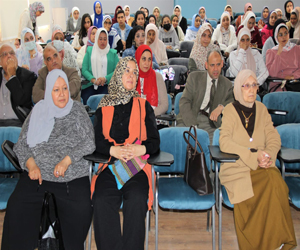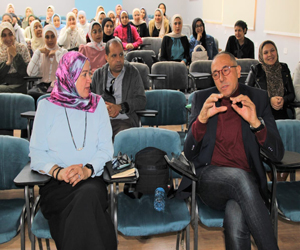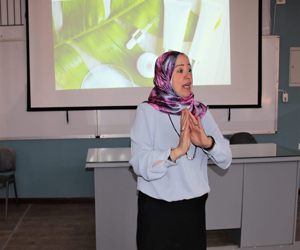A lecture discussing "Plants and the Environment for Sustainable Development" at the Faculty of Science
The Community Service and Environmental Development Sector at the Faculty of Science organized a lecture entitled "Plants and the Environment for Sustainable Development", under the auspices of Prof. Mahmoud El-Meteini, President of Ain Shams University, Prof. Ghada Farouk, Acting Vice President for Community Service and Environmental Development, Prof. Muhammad Ragaa Al-Satohi, Dean of the Faculty of Sciences at the university, in the presence and supervision of Prof. Amani Suleiman, Vice Dean for Community Service and Environmental Development.
Prof. Amal Ahmed Morsi, Professor and Head of the Botany Department, Faculty of Science, lectured at the symposium.
At the beginning of the lecture, Prof. Amal Ahmed Morsi explained that sustainable development requires an integrated methodology that takes into account environmental conditions in addition to economic growth, noting that in 1987 the Brundtland Committee of the United Nations defined sustainability as “meaning meeting the needs of the present without compromising the ability of future generations to meet their needs.” Today, about 140 developing countries in our world are looking for ways to meet their development needs, but this is accompanied by an increasing threat of climate change.
She emphasized that sustainable development aims at the global call for action to eradicate poverty, protect the environment and climate, and ensure that people everywhere enjoy peace and prosperity, explaining that in 2015, the Member States of the United Nations unanimously adopted the 2030 Agenda for Sustainable Development (Agenda 2030). ) with its 17 goals, which are based on 169 detailed goals and apply to all nations and all sectors such as cities, companies, schools, and organizations, all of which are called upon to act.
Dr. AmlMorsiadded that what distinguishes this agreement from others is that all 193 member states of the United Nations - in addition to hundreds of thousands of stakeholders - have never agreed on a long-term vision for our collective future, and these seventeen goals came as the following future goals that the world aspires to achieve.
She addressed the three main dimensions of sustainable development (social - economic - environmental), which are not separate from each other. Without the integration of these dimensions, it is not possible to achieve the real change needed to secure a decent life for the Egyptian citizen and protect his environment in the short and long term.
She indicated during the lecture that climate change and excessive investment, this has led to increased risks surrounding the planet and humanity and that it is essential to re-evaluate the adequacy of the prevailing approaches to deal with the growing demand for food and other resources, confirming the end of her lecture that research and innovations today have become the key to the future. more sustainable.
A documentary film was presented on petrified forests, their importance, and how to protect them from urban sprawl.
The students of the Department of Botany in the college made several presentations explaining the importance of plants in our daily lives and how we can benefit from various types of medicinal herbs, essential oils, and plant fibers in all areas of life, in addition to the great importance that plants play in our surrounding environment. Forensic botany is one of the modern sciences that mainly depends on the plant or any of its parts, such as seeds, pollen, leaves, fruits, and wood. It is used today in the investigation of crimes and can contribute to determining the cause of death, as well as identifying the previous location of the victims.
At the conclusion of the activities, Prof. AmalMorsi, Head of the Botany Department at the Faculty, honored the students who participated in the lecture by awarding them certificates of appreciation in honor of their efforts.
 |
 |
 |
|
.svg)




